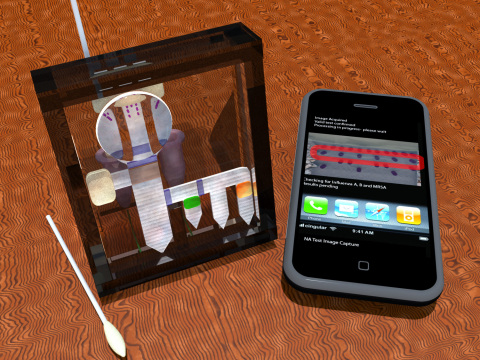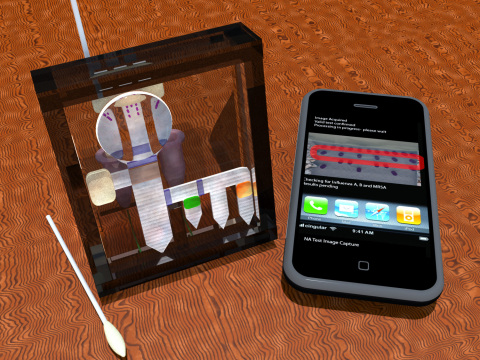NISKAYUNA, N.Y.--(BUSINESS WIRE)--You’ve heard of on-demand TV, now imagine on-demand medical diagnosis – anytime, anywhere in the world. Scientists at GE Global Research, the technology development arm of the General Electric Co. (NYSE: GE), are working with a team based at the University of Washington to develop a new medical device, the size of a pack of playing cards, that can detect infectious disease by way of a simple nasal swab, in less than an hour. See a video simulation of how such a device could work and hear from GE’s lead researcher by going to http://youtu.be/jJVgIIee2xM.
“We live in an on-demand world, where news and information is instantaneous. We’ve asked why the same can’t be done for diagnosing infectious diseases where early detection is so critical to positive patient outcomes,” said David Moore, Manager of the Membrane and Separation Technologies Lab at GE Global Research and Co-Principal Investigator on the project. “As part of our program with DARPA, we’re developing a small, light-weight device that a doctor could fit in their pocket. This unit could readily detect multiple pathogens in limited resource settings, such as military outposts or communities in remote areas.”
GE is conducting the research jointly with a team led by Prof. Paul Yager, Chair of Bioengineering at the University of Washington. "We're very excited about this team's unique ability to combine new designs for paper-based microfluidics with new nucleic amplification methods and GE's novel paper chemistries to help develop the first fully-disposable versatile pathogen identification technology for use in the developed and developing worlds, " said Yager
Other collaborators in the project, which is funded by an 18-month, $9.6 million grant from the Defense Advanced Research Projects Agency (DARPA), include Seattle Children’s, Epoch Biosciences, and PATH. The focus is the development of instrument-free nucleic acid amplification for pathogen identification. The team was previously awarded a DARPA grant for $4 million, and is also funded by an ongoing $5.7 million grant from the National Institutes of Health (NIH) that focuses on immunoassay development for detection of influenza.
GE will leverage its deep domain expertise in diagnostics materials development, nucleic acid analysis, and device design to help develop a handheld unit that is easy to pick-up and use. The fully-disposable device will be paper-based and will include no complex instrumentation. The test will be activated once exposed to a nasal swab, and in less than an hour, will change color to indicate the presence of different target diseases.
“We want this to be as simple as a pregnancy test, where sample preparation to read-out is all done within the device with minimal user intervention,” Moore continued.
As part of this program, GE scientists will be developing next-generation paper and membrane materials, while also utilizing a suite of commercial papers and membranes, including Whatman FTATM.
The first disease researchers will target is methicillin-resistant Staphylococcus aureus, or MRSA, a drug-resistant bacterium responsible for hard-to treat infections. MRSA is especially problematic in institutional settings, like hospitals prisons, and military bases, where people generally live in close quarters. Fast diagnosis is key because MRSA infections can worsen rapidly, and in less than a week, take hold in human tissue and become very difficult to treat.
In addition to MRSA, the device GE is researching would be built to quickly detect a broad range of pathogens, including sexually transmitted diseases (STDs) and various viral infections. “Ideally any disease could be detected, provided the target’s DNA and/or RNA could be isolated, purified, amplified, and detected,” Moore added.
Moore continued, “The team is excited about this effort and the difference it could make. There’s a strong desire to see the technology commercialized and used at clinics, hospitals, and the military health system, and eventually in the field and at home.”
GE also envisions primary market opportunities in hospitals, clinics and doctor’s offices, where this device could be used to render point-of-care diagnosis.
In 2011, GE scientists began work on a related DARPA-funded program, in conjunction with InDevR, to build a device to improve flu diagnosis at point-of-care. This device would confirm a patient’s flu status at the doctor’s office, without the need to send samples to an outside lab for testing. The device could also prove valuable at remote military bases or the site of a humanitarian mission where health officials are dealing with a major pandemic. Read more at: http://www.genewscenter.com/Press-Releases/GE-and-InDevR-Scientists-Developing-Breakthrough-Device-to-Improve-Diagnosis-of-Flu-at-the-Point-of-3694.aspx
About GE Global Research
GE Global Research is the hub of technology development for all of GE's businesses. Our scientists and engineers redefine what’s possible, drive growth for our businesses, and find answers to some of the world’s toughest problems.
We innovate 24 hours a day, with sites in Niskayuna, New York; San Ramon, California; Bangalore, India; Shanghai, China; Munich, Germany; and Rio de Janeiro, Brazil.
Visit GE Global Research on the web at www.ge.com/research. Connect with our technologists at http://edisonsdesk.com and http://twitter.com/edisonsdesk.
The views expressed are those of the author and do not reflect the official policy or position of the Department of Defense or the U.S. Government.




